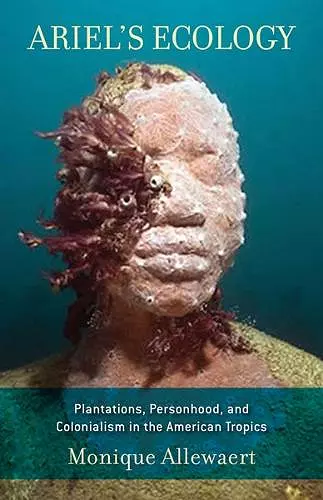Ariel's Ecology
Plantations, Personhood, and Colonialism in the American Tropics
Format:Paperback
Publisher:University of Minnesota Press
Published:11th Jul '13
Should be back in stock very soon

What happens if we abandon the assumption that a person is a discrete, world-making agent who acts on and creates place? This, Monique Allewaert contends, is precisely what occurred on eighteenth-century American plantations, where labor practices and ecological particularities threatened the literal and conceptual boundaries that separated persons from the natural world.
Integrating political philosophy and ecocriticism with literary analysis, Ariel’s Ecology explores the forms of personhood that developed out of New World plantations, from Georgia and Florida through Jamaica to Haiti and extending into colonial metropoles such as Philadelphia. Allewaert’s examination of the writings of naturalists, novelists, and poets; the oral stories of Africans in the diaspora; and Afro-American fetish artifacts shows that persons in American plantation spaces were pulled into a web of environmental stresses, ranging from humidity to the demand for sugar. This in turn gave rise to modes of personhood explicitly attuned to human beings’ interrelation with nonhuman forces in a process we might call ecological.
Certainly the possibility that colonial life revokes human agency haunts works from Shakespeare’s Tempest and Montesquieu’s Spirit of the Laws to Spivak’s theories of subalternity. In Allewaert’s interpretation, the transformation of colonial subjectivity into ecological personhood is not a nightmare; it is, rather, a mode of existence until now only glimmering in Che Guevara’s dictum that postcolonial resistance is synonymous with “perfect knowledge of the ground.”
"Timely, provocative, and incisive, Ariel’s Ecology builds an impressive case for the emergence in the revolutionary Atlantic world of an ‘ecological’ personhood in writings from and about plantation ‘zones,’ variously authorized texts where ‘vitality’ and ‘agency’ heretofore thought by critics to have been abrogated from the enslaved and colonized emerge as byproducts of an ‘assemblage’ of relations with the natural world. Monique Allewaert’s important study will be of great interest to scholars working within and across multiple fields."—Sean X. Goudie, Penn State University
"The book brims with theoretical and aesthetic insights on every page...With its inclusion of delightful botanical plates, rare archival documents, maps, engravings, and paintings, Ariel's Ecology will not only attract an interdisciplinary audience of scholars, educators, and students, but will also speak to a broader audience curious about subject formation in the American tropics."—Southern Spaces
"With capacious readings across a wide range of print, manuscript, and oral texts both from the colonial period and beyond, Allewaert makes a methodological argument for the use of extra-generic sources in early American criticisms. A crucial intervention not only in materialist and postcolonial ecocriticisms, but also in political theory, diasporic American studies, and early American studies generally."—ISLE: Interdisciplinary Studies in Literature and Environment
"Ariel’s Ecology provides a valuable, thought-provoking guide to this environment and those histories, and it will undoubtedly spur further thinking and writing in its wake."—Clio
ISBN: 9780816677283
Dimensions: 216mm x 140mm x 25mm
Weight: unknown
248 pages